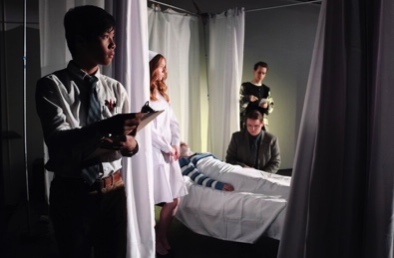Mississippi School for Mathematics and Science’s Dramatic Performance class produced Agatha Christie’s “The Patient” on Dec. 11 to an enthusiastic crowd of about 100 students, faculty, and parents in Shackelford Auditorium. The play depicts a doctor and a detective who intuit the identity of an attempted murderer who is part of a dysfunctional household.
Dr. Thomas Easterling, who teaches Dramatic Performance, said the prospect of putting on the school’s first mystery in more than a decade intrigued students from the start.
“Members of the class decide in August which one-acts will be performed later in the semester,” Easterling said. “They selected ‘The Patient’ quickly, and showed enthusiasm and creativity for the project from casting through the final performance.”
Easterling said the most difficult part of working on the play involved deciding whether to play certain parts for laughs or for dramatic tension. The student directors and cast decided that they’d go for the latter, even though they knew certain lines that sounded great in 1962, when the play was first performed, and in the 1940s, when it was set, might seem stilted in 2019.

“Regardless, I could tell that the audience bought into everything the cast tried to do with the play and with the characters,” Easterling added. “They listened and watched attentively. I heard several students explaining the rationales for their solutions to the mystery well into tutorials that evening.”
The MSMS Dramatic Performance class takes place each fall, and features an improv comedy night as well as the two student-selected one-act plays. Easterling said the popularity of the class and its productions affirms the relevance of the arts and humanities at a STEM-oriented school.
“Our students know that creativity assumes different shapes,” Easterling said. “Sometimes it involves figuring out what motivates a character, or what an accent should sound like. Sometimes it involves engineering parts of the set, or determining the most effective use of lighting. Arts and humanities classes at MSMS make our students more complete human beings, and I am grateful our administrators embrace that.”

